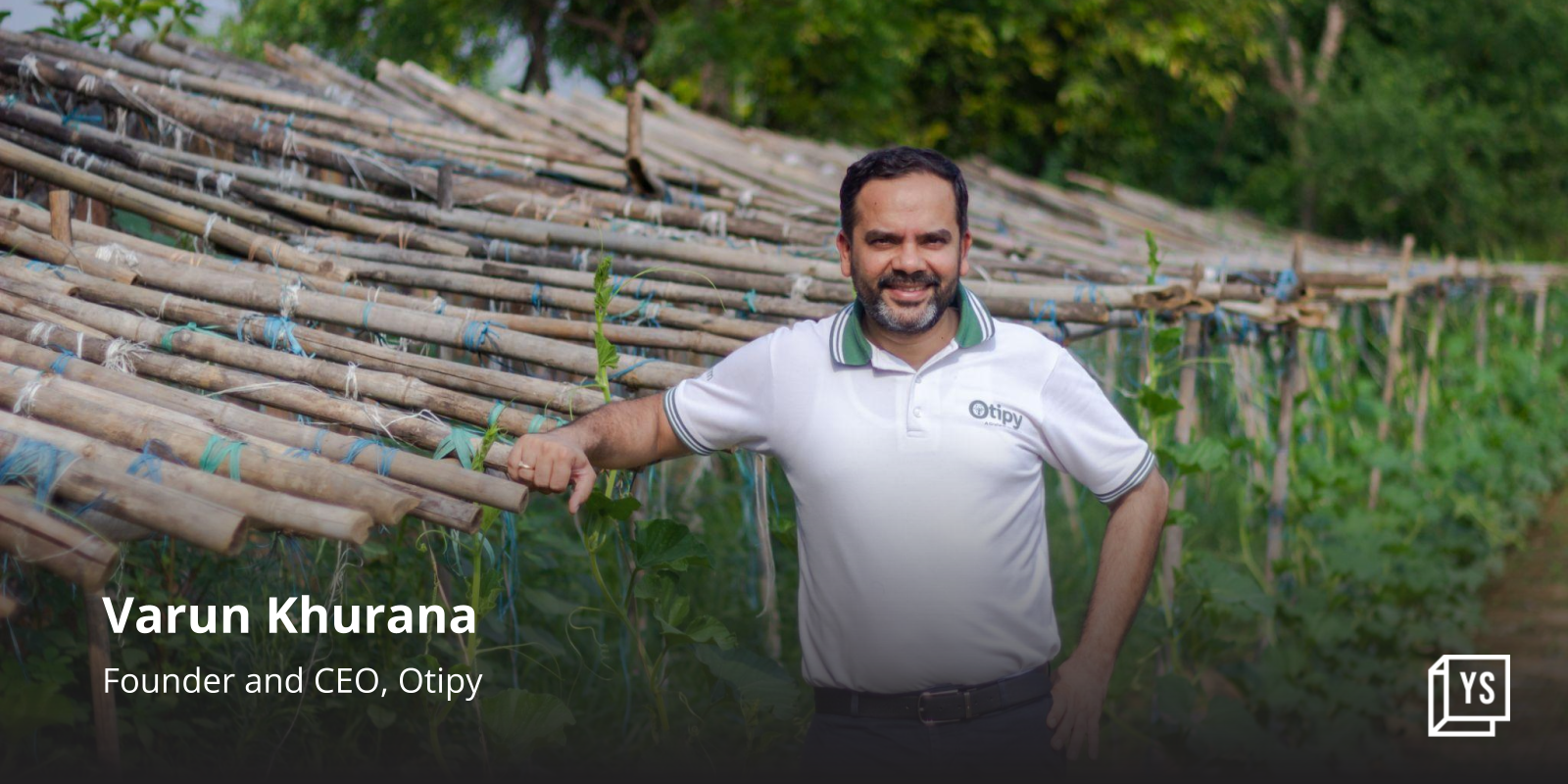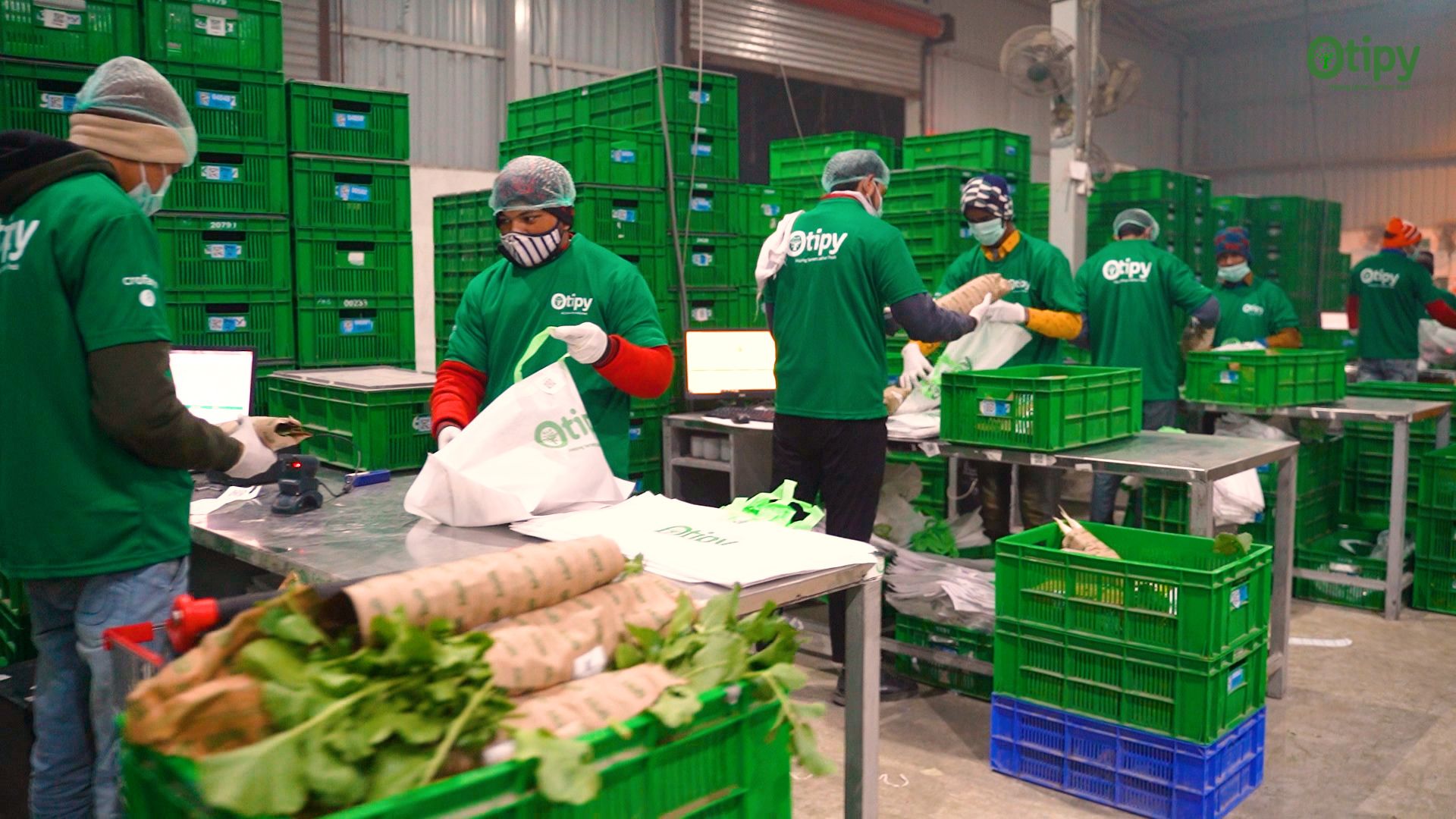
Farm-to-fork platforms are crucial in modern food supply chains for freshness, quality, farmer engagement, transparency, traceability, and accessibility.
These platforms reduce environmental impact, promote local agriculture, and have quality control measures in place. They also provide market access to small farmers, contributing to rural development and bridging the urban-rural divide.
Varun Khurana and Prashant Jain co-founded in 2020 with a similar philosophy in mind, leveraging the power of artificial intelligence and business intelligence.
Gurugram-based Otipy is a B2B2C community-based agritech platform, connecting consumers, resellers, and farmers to bring fresh produce to consumers’ doorstep within 12 hours. The startup employs an artificial intelligence (AI) model to anticipate demand and minimise food wastage.
“We focus on direct procurement from farmers based on demand predictions. This eliminates intermediaries, ensuring fair payments and empowering the farming community,” says Khurana, CEO of Otipy, operated by Crofarm Agriproducts Pvt Ltd.
Otipy’s model uses data regression and machine learning to calculate demand based on more than 40 parameters such as previous customer orders, seasonality, prices, temperature, and holidays to accurately forecast demand for each item. This approach offers farmers insights into crop planning and harvesting cycles and ensures consumers receive fresh produce exactly when needed, says the founder.
The genesis
The idea of Otipy was derived from Khurana’s experience and learnings from his tenure at Grofers, an online grocery delivery platform.
“After Grofers, I spent time on farms, which led to the realisation that there was a significant gap between the quality demanded by end-users and the quality produced at the farm level. This gap was compounded by substantial wastage, which ultimately resulted in consumers paying a high premium compared to the price at which farmers sold their produce,” he says.
Otipy, which was initially a B2B company, faced challenges such as low margins, extended credit periods, and cash collection issues. After some time, it shifted its focus to a B2B2C model for fresh produce. The startup currently has more than 500 employees.
How it operates
Otipy operates an ecommerce app that provides farm-fresh vegetables and fruits. It also offers private labels such as House of Fresh for freshly baked bakery items; One Farm for staples like grains, spices, oils, and dry fruits from farms; and Farm Tale, which sources milk within hours.
The startup also offers over 1,300 daily-use fast-moving consumer goods (FMCG) from brands and partners such as Farmers Moo, Earthwise, Danodia Foods, Pehle Jaisa, Aashirwaad, Fortune, Haldirams, Britannia, Tata, Daawat, Dhara, Nutraj, Bikano, and Paperboat.
Otipy has tied up with over 20,000 small farmers and 100 farmer producer organisations to assist with accurate demand forecasting, provide insights for crop planning and harvesting cycles, and enable informed decisions. The platform also assists farmers in accessing quality seeds, fertilisers, and financing, thus helping them optimise crop production for better yields and profitability.
Farmers receive weekly payments after quality checks, and a detailed invoice is sent to them after receiving their produce. Payments are processed weekly, and a ledger is sent to farmers via their preferred communication method.
Ensuring minimal wastage and quality control
Otipy has implemented pre-cooling units on farms to keep produce fresh, even during peak summer. These units maintain the produce at a lower temperature than the ambient temperature, thus extending shelf life and reducing quality deterioration.
This practice also minimises temperature shocks and maintains relative humidity, says Khurana.
Otipy’s warehouses are equipped with temperature and humidity control systems, which preserve the freshness and quality of produce. The startup has created software that optimises time taken for sorting, grading, multiple quality checks, and packaging, with a turnaround time of four hours.
<figure class="image embed" contenteditable="false" data-id="528321" data-url="https://images.yourstory.com/cs/2/6c7d986093a511ec98ee9fbd8fa414a8/OtipyPictures101-1697190992539.jpg" data-alt="Otipy’s warehouses" data-caption="
Otipy’s warehouse
” align=”center”> Otipy’s warehouse
As the startup works on a 12-hour delivery model, the need for long-time storage is eliminated.
Khurana explains, “The supply chains are designed for speed, so that the produce spends minimum time in the process and hence undergoes minimum degradation and minimum wastage.”
A blockchain-based traceability system enables farmers to track the source of each item and the produce’s journey from farm to warehouse.
“The traceability system also allows us to identify the source of the produce and assess its quality. We then reward farmers with an monetary incentive to maintain consistent quality,” Khurana explains.
Otipy’s system also bridges the last-mile logistics gap with tech tools such as live tracking of riders and packages.
.thumbnailWrapper
width:6.62rem !important;
.alsoReadTitleImage
min-width: 81px !important;
min-height: 81px !important;
.alsoReadMainTitleText
font-size: 14px !important;
line-height: 20px !important;
.alsoReadHeadText
font-size: 24px !important;
line-height: 20px !important;

The startup claims its logistics operation costs only Rs 4 per kg from warehouse to consumer, as opposed to Rs 6 to Rs 8 normally. It says it has achieved a 10X improvement in waste reduction from 30-40% to under 4% throughout the farm-to-fork value chain.
Otipy operates in Delhi NCR, Mumbai, Sonipat, Meerut, and Bhiwadi.
Business and growth
The Indian agritech market is predicted to reach $24 billion by 2025, according to an EY report. The major players in the segment are Big Basket Daily, , and .
Khurana says Otipy’s prediction model and pre-cooling at farm-gate help it stand out from competition.
The startup generated a total revenue of Rs 115 crore in FY23, and it operates on gross margins of 32%. Its active users grew from 96,324 to 1,106,499 in two years.
Otipy has a network of more than 1,000 resellers and over 20,000 farmers and moves 160 tonnes of fresh produce every day.
The company raised $32 million in a Series B round led by Westbridge Capital, SIG and Omidyar Network India, in March last year. It plans to raise $75 million in Series C funding to support growth and innovation. It is also looking to expand its services to major metro cities such as Bengaluru, Hyderabad, and Chennai.
The agritech platform aims to generate Rs 210 crore in revenue and onboard more than 1.5 million consumers by March 2024. It also plans to expand its product categories to milk, paneer, pulses, grains, and spices.
The startup is also exploring brand partnerships, farm visits for school children, restaurant collaborations, and interactive screens in corporate settings, as additional revenue streams.
Edited by Swetha Kannan




![Read more about the article [Funding alert] Neobank Jupiter raises $86M in Series C round](https://blog.digitalsevaa.com/wp-content/uploads/2021/12/Jupiterappanddebitcard1-1625922052030-300x192.png)





